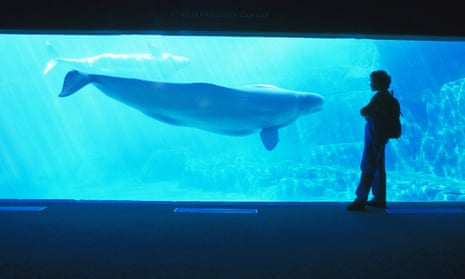For years the Vancouver aquarium fended off pressure from animal right activists, local government and residents, arguing instead that whales and dolphins were central to its mission. But this week the tourist attraction gave in to public pressure, and announced that it would end the practice of keeping cetaceans in captivity.
“It had become a local hot topic, to the point where it was just hijacking everything else,” said John Nightingale, the aquarium’s president.
“As much as we understand the tremendous value that an animal like a beluga whale brought to our mission … public controversy had gotten to the point where it was just preventing us from moving forward on so many other parts of our mission.”
The decision follows years of campaigning in the western Canadian city. In May – after two beluga whales died just weeks apart – municipal authorities voted to ban the aquarium from bringing in new cetaceans.
The aquarium vowed to fight back, citing plans for a C$20m Arctic exhibit featuring belugas and the educational and awareness opportunities offered by the captive cetaceans.
But public opinion continued to shift – partly galvanised by the deaths of five cetaceans within a 15-month span. Along with the two beluga whales who were found to have died due to an unknown toxin, the facility lost a false killer whale to a bacterial infection and two harbour porpoises, one to pulmonary disease and the other of an unknown cause.
Currently the facility is home to just one cetacean: Helen, a Pacific white-sided dolphin with partial flippers. Believed to be in her 30s, Helen has spent more than decade at the aquarium after she was found entangled in a fishing net in Japan.
The aquarium said it would weigh its options for the lone dolphin in the coming months although, neither of the solutions being considered are perfect, said Nightingale. The facility could bring in a companion animal to stay with her as long as she lives – which would violate this week’s announcement – or potentially risk her health by sending her to another facility.
Another exemption being sought is for the aquarium’s longstanding cetacean rescue program. While more than 99% of rescues are returned to the wild, some cannot be, Nightingale said. The aquarium wants to be allowed to house these animals in its display pools as they wait for them to be moved to their new homes.
The announcement was welcomed across the country by animal rights campaigners, who described it as the culmination of a decades-long battle.
Marineland in Niagara Falls, Ontario is now believed to be the only other facility in the country that houses cetaceans, boasting on its website of the “largest collection of beluga whales in the world”.
“The Vancouver Aquarium appears to have finally accepted that whale and dolphin captivity is no longer socially acceptable in Canada,” said Camille Labchuk of Animal Justice. “The writing is on the wall for the whale and dolphin captivity industry.”

Comments (…)
Sign in or create your Guardian account to join the discussion